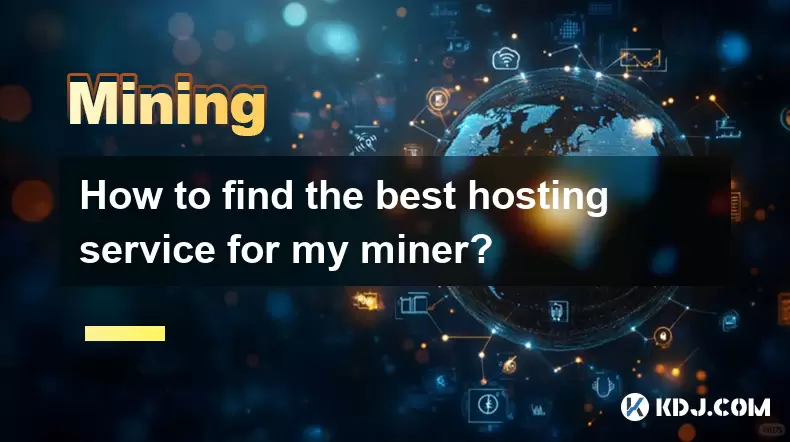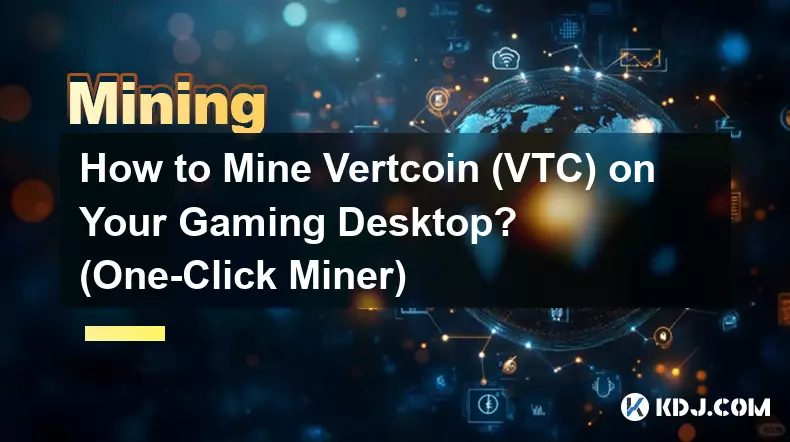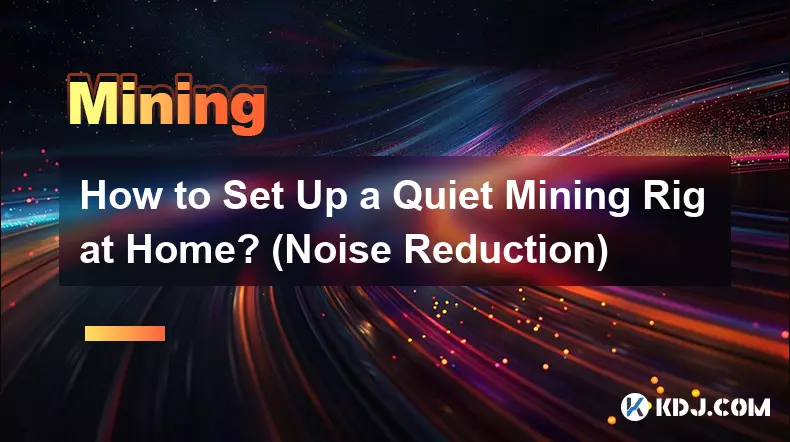-
 bitcoin
bitcoin $87959.907984 USD
1.34% -
 ethereum
ethereum $2920.497338 USD
3.04% -
 tether
tether $0.999775 USD
0.00% -
 xrp
xrp $2.237324 USD
8.12% -
 bnb
bnb $860.243768 USD
0.90% -
 solana
solana $138.089498 USD
5.43% -
 usd-coin
usd-coin $0.999807 USD
0.01% -
 tron
tron $0.272801 USD
-1.53% -
 dogecoin
dogecoin $0.150904 USD
2.96% -
 cardano
cardano $0.421635 USD
1.97% -
 hyperliquid
hyperliquid $32.152445 USD
2.23% -
 bitcoin-cash
bitcoin-cash $533.301069 USD
-1.94% -
 chainlink
chainlink $12.953417 USD
2.68% -
 unus-sed-leo
unus-sed-leo $9.535951 USD
0.73% -
 zcash
zcash $521.483386 USD
-2.87%
How to find the best hosting service for my miner?
Hosting services for crypto mining provide essential infrastructure like power, cooling, and security to optimize hardware performance and profitability.
Jul 15, 2025 at 06:07 pm

Understanding the Role of Hosting Services in Mining
When it comes to cryptocurrency mining, a hosting service plays a crucial role in ensuring that your mining hardware operates efficiently and with minimal downtime. Unlike traditional web hosting, crypto miner hosting involves providing physical space, electricity, cooling, and internet connectivity for mining rigs. Choosing the right host can significantly impact your hash rate performance, electricity costs, and overall profitability.
The primary reason miners opt for third-party hosting services is to avoid the challenges associated with running large-scale operations from home or office spaces. These include high energy consumption, heat generation, noise pollution, and the need for constant maintenance. A reliable hosting provider addresses all these concerns while optimizing uptime and efficiency.
Evaluating Electricity Costs and Energy Efficiency
One of the most critical factors to consider when selecting a hosting service is electricity cost. Since mining consumes substantial amounts of power, even a small difference in kWh rates can have a major impact on your bottom line over time.
- Look for providers located in regions with low energy tariffs
- Ask whether the facility uses renewable energy sources
- Confirm whether the quoted price includes both base electricity and additional fees
Some hosting companies offer tiered pricing models based on usage or power draw, so be sure to understand the full billing structure before committing. It's also wise to inquire about energy efficiency metrics, such as PUE (Power Usage Effectiveness), which reflects how well the facility manages non-mining-related energy consumption like cooling and lighting.
Analyzing Cooling Systems and Environmental Controls
Mining equipment generates a significant amount of heat, especially when operating at scale. An effective cooling system is essential for maintaining optimal temperatures and prolonging the lifespan of your hardware. The best hosting services invest in advanced HVAC systems, airflow management, and sometimes even liquid cooling technologies to ensure stable operating conditions.
- Inquire about the type of cooling infrastructure used
- Ask if there are real-time temperature monitoring systems
- Check whether they provide custom airflow configurations for different types of miners
Facilities located in naturally cooler climates may have an advantage in reducing cooling costs, which could translate into lower hosting fees for you. Make sure the hosting provider has contingency plans in place for extreme weather events or system failures.
Assessing Network Infrastructure and Uptime Guarantees
A strong and stable internet connection is vital for uninterrupted mining operations. Delays or disconnections can result in lost hash time and reduced earnings. Therefore, it’s important to evaluate the network bandwidth, latency, and uptime guarantees offered by the hosting service.
- Ensure the facility offers low-latency connections to mining pools
- Verify whether they have redundant internet providers
- Ask about their SLA (Service Level Agreement) regarding network availability
Many top-tier hosting providers operate within Tier 3 or Tier 4 data centers, which offer high redundancy and fault tolerance. This ensures that even during outages or maintenance, your mining operations continue without interruption. Additionally, some facilities provide dedicated IP addresses or private VLANs for enhanced security and control.
Security Measures and Physical Access Control
Your mining hardware represents a significant investment, making physical and digital security a top priority. Reputable hosting services implement multiple layers of protection to prevent theft, tampering, or unauthorized access.
- Confirm whether the site uses 24/7 surveillance systems
- Ask about biometric or keycard-based access controls
- Inquire about fire suppression systems and environmental alarms
Some hosts allow remote monitoring through secure portals where you can check the status of your rigs and receive alerts in case of anomalies. If you plan to visit the facility, find out what kind of visitor protocols they follow and whether prior authorization is required.
Comparing Pricing Models and Contract Terms
Pricing structures among hosting providers vary widely. Some charge a flat monthly fee per machine, while others base their pricing on power consumption, space occupied, or hash rate contribution. It’s important to compare total cost of ownership across different providers rather than focusing solely on headline prices.
- Review contract terms related to early termination fees
- Understand whether setup or installation charges apply
- Clarify whether maintenance and support are included
Flexible contracts that allow scaling up or down depending on your mining activity can be beneficial. Always read the fine print and clarify any ambiguities before signing an agreement.
Frequently Asked Questions
Q: Can I bring my own mining hardware to a hosting facility?Most hosting providers allow clients to use their own equipment, but they may impose requirements regarding noise levels, heat output, and compliance with safety standards. Be sure to confirm compatibility before shipping your devices.
Q: How do I monitor my miners remotely?Reputable hosting services typically provide remote monitoring tools via a secure dashboard. These platforms allow you to track performance metrics such as hash rate, temperature, and power consumption in real time.
Q: Are there minimum contract durations for miner hosting?Yes, many providers require a minimum commitment period, often ranging from three months to one year. Shorter-term options may exist but usually come at a premium. Always review cancellation policies and renewal terms.
Q: What happens if my mining rig malfunctions?Most hosting facilities offer basic maintenance services, including rebooting stuck machines or replacing faulty fans. However, complex repairs may require you to handle them personally or pay for technician assistance. Clarify the scope of support services beforehand.
Disclaimer:info@kdj.com
The information provided is not trading advice. kdj.com does not assume any responsibility for any investments made based on the information provided in this article. Cryptocurrencies are highly volatile and it is highly recommended that you invest with caution after thorough research!
If you believe that the content used on this website infringes your copyright, please contact us immediately (info@kdj.com) and we will delete it promptly.
- UAE Investor Secures Major Stake in Trump-Linked Crypto Firm Amidst Shifting Geopolitical Tides
- 2026-02-02 07:10:01
- Pepe Meme Coin: Navigating the Hype, Price Predictions, and Future Outlook in 2026 and Beyond
- 2026-02-02 07:05:01
- Blockchain Gaming's Quiet Revolution: Unpacking Latest Trends and Industry Insights Amidst Market Shifts
- 2026-02-02 06:30:01
- IPO Genie, Tokenization, and YouTubers: The Big Apple's Next Big Bet on Democratized Wealth
- 2026-02-02 06:40:02
- Aptos in a Bind: Downtrend Deepens, But a Brief Relief Bounce Looms Before the Next Plunge
- 2026-02-02 07:00:01
- Pi Network, ATL, and Community: Navigating the Currents of a Mobile-First Crypto Movement
- 2026-02-02 07:00:01
Related knowledge

How to Spot a Cloud Mining Scam? (Red Flags to Watch For)
Feb 02,2026 at 08:20am
Unrealistic Return Promises1. Platforms advertising guaranteed daily returns above 1–2% without disclosing underlying hardware, electricity costs, or ...

How to Earn Passive Income with DePIN Mining? (New Trend 2026)
Feb 01,2026 at 12:40pm
Understanding DePIN Mining Mechanics1. DePIN mining relies on real-world infrastructure participation rather than computational hashing. Users deploy ...

How to Mine Vertcoin (VTC) on Your Gaming Desktop? (One-Click Miner)
Feb 02,2026 at 03:39am
Understanding Vertcoin's Mining Algorithm1. Vertcoin uses the Verthash algorithm, which is intentionally memory-hard and designed to resist ASIC domin...

How to Set Up a Quiet Mining Rig at Home? (Noise Reduction)
Feb 01,2026 at 11:00pm
Acoustic Enclosure Design1. Use rigid, dense materials such as MDF or acoustic-grade plywood for the enclosure walls to block mid-to-high frequency no...

How to Choose a Mining Pool with Lowest Fees? (Fee Comparison)
Feb 02,2026 at 02:39am
Understanding Mining Pool Fee Structures1. Pool operators charge fees to cover infrastructure, maintenance, and administrative costs. These fees manif...

How to Mine Bitcoin on Mac (M1/M2/M3)? (Software Tutorial)
Feb 01,2026 at 07:19pm
Understanding Bitcoin Mining on Apple Silicon1. Bitcoin mining relies on solving cryptographic puzzles using computational power, and Apple’s M1, M2, ...

How to Spot a Cloud Mining Scam? (Red Flags to Watch For)
Feb 02,2026 at 08:20am
Unrealistic Return Promises1. Platforms advertising guaranteed daily returns above 1–2% without disclosing underlying hardware, electricity costs, or ...

How to Earn Passive Income with DePIN Mining? (New Trend 2026)
Feb 01,2026 at 12:40pm
Understanding DePIN Mining Mechanics1. DePIN mining relies on real-world infrastructure participation rather than computational hashing. Users deploy ...

How to Mine Vertcoin (VTC) on Your Gaming Desktop? (One-Click Miner)
Feb 02,2026 at 03:39am
Understanding Vertcoin's Mining Algorithm1. Vertcoin uses the Verthash algorithm, which is intentionally memory-hard and designed to resist ASIC domin...

How to Set Up a Quiet Mining Rig at Home? (Noise Reduction)
Feb 01,2026 at 11:00pm
Acoustic Enclosure Design1. Use rigid, dense materials such as MDF or acoustic-grade plywood for the enclosure walls to block mid-to-high frequency no...

How to Choose a Mining Pool with Lowest Fees? (Fee Comparison)
Feb 02,2026 at 02:39am
Understanding Mining Pool Fee Structures1. Pool operators charge fees to cover infrastructure, maintenance, and administrative costs. These fees manif...

How to Mine Bitcoin on Mac (M1/M2/M3)? (Software Tutorial)
Feb 01,2026 at 07:19pm
Understanding Bitcoin Mining on Apple Silicon1. Bitcoin mining relies on solving cryptographic puzzles using computational power, and Apple’s M1, M2, ...
See all articles










































































